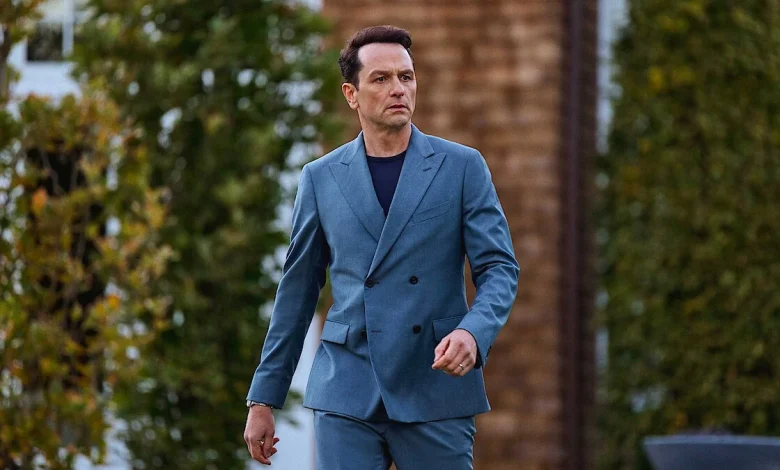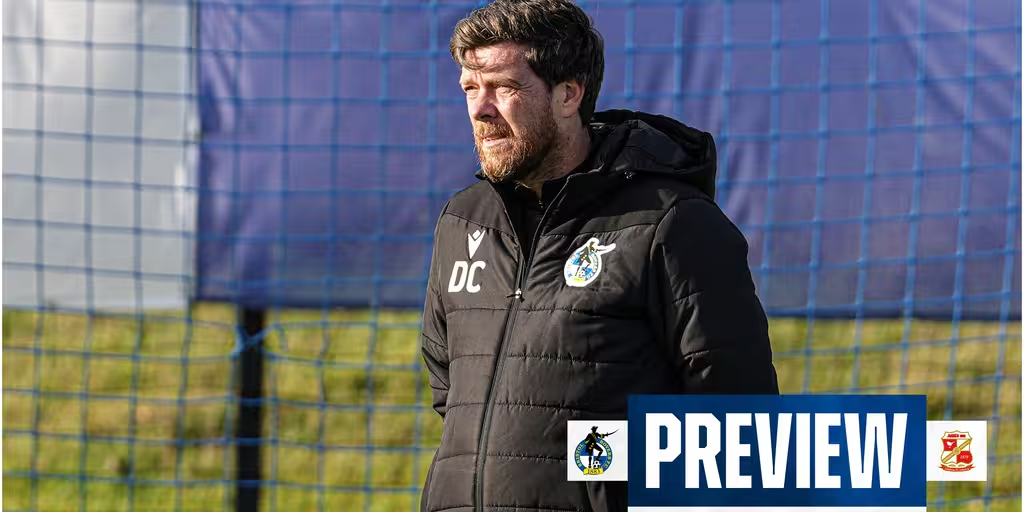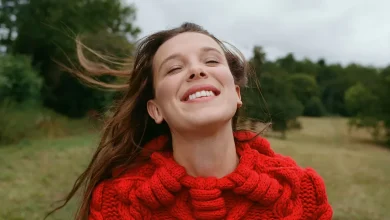Matthew Rhys Tears into The Beast in Me

This article contains major character or plot details.
The Beast in Me was so far out of Matthew Rhys’s wheelhouse that he had to get a special certificate to play Nile Jarvis.
In the thriller’s third episode, Nile, a real estate magnate suspected of killing his first wife, summons his next-door neighbor Aggie (Claire Danes), a famous author writing a book about him, to one of his construction sites in New York City. There, he takes her to the unsecured ledge of an unfinished building and interrogates her about her communication with a tenacious FBI agent who’s pursued Nile for years.
The scene is full of suspense and intimidation but also a lot of preparation: Rhys had to attend special OSHA training before filming this scene, because it called on him to operate a construction lift that Aggie and Nile take on their ascent.
“I’d wear a high-vis vest and a hard hat, and two young, fine gentlemen taught me how to use that thing,” Rhys tells Tudum with a laugh. “Because it’s on a real construction site, and it’s an external construction elevator, you have to have an OSHA certificate. So, in the state of New Jersey for the next two years, I can still use an external construction site elevator, which I’m very proud of.”
Heavy machinery aside, The Beast in Me was still a departure for Rhys, who tends to play tortured protagonists like undercover Russian spy Philip Jennings on The Americans or the titular lawyer of Perry Mason. But Nile is an entirely different, well, beast: He’s charming, dangerously intelligent, impulsive, ravenous, and a sociopath. Thankfully, the Welsh actor was dying to tear into the role (roast chicken and all).
“I’m not usually considered for parts like this,” he says, “and I’m desperate to do it because they’re so enjoyable.”
As The Beast in Me unfolds, Nile is irresistibly drawn to his next-door neighbor because he recognizes they share a similar darkness beneath the surface. Nile is flirting with self-destruction by befriending Aggie and allowing her to write a book about him because — spoiler alert — he did murder his first wife. A suspenseful game of cat-and-mouse soon develops between them, and it leads to Nile’s downfall.
Below, Rhys unpacks Nile and Aggie’s complex relationship, a surprising parallel to The Americans, Nile’s fate, and more.
How did you come to join The Beast in Me?
Matthew Rhys: “With enormous gratitude” is my first answer. I was very grateful. I mean that sincerely, because I thought the part was somewhat out of my reach. I’m not usually considered for parts like this. I don’t get to play these parts, and I’m desperate to do it just because they’re so enjoyable. I got approached by the Beast team, and they sent me the script, and I was like, “Look, if you’d be willing for me to play, I would love to,” because the material was so rich and the part itself was so alluring — but also slightly frightening in a challenging sense, because I think it’s very easy to walk those parts into possible cliché, which I was very wary and scared of. So, yeah, as soon as they sent me a script, I said, “Listen, if you’re serious about this, I’m 100% in.”
Given that you don’t typically play characters like Nile, how did you find your way into the role?
Rhys: You just go back to all the old [techniques] of grounding in a real place. I wanted to make [Nile and Aggie’s] relationship as real as possible, because I thought if you believed that relationship, then anything was possible. It was a balance because there was a warmth to him that is not overt on the page. I wanted there to be a humanity to him, I think, because they’ve both been through such enormous moments in their lives — there’s a damage to him that’s made him vulnerable. Obviously, his upbringing has done the same thing. So all of those key factors, I hoped, made him approachable and a little more real. And from that, you hope that Aggie, who’s been through the same thing, can see, “Oh, well, he’s similar to me in that he’s been through these things, and he’s been judged by the world.”
And, obviously, [working] with Claire makes your life as an actor that much easier because it’s all there — all you have to do is react, really.
How would you describe Nile and Aggie’s dynamic?
Rhys: There is an enormous similarity between them. And I think they recognize that in each other. They see each other as peers — very unlikely peers. That is as much a kind of revelation as it is an attraction, to go, “God, I never thought I would see you as a friend or certainly a confidant.” And that intimacy accelerates very quickly [when] two people have possibly shared a similar experience.
Watching the show, you get the sense that Nile is not only surprised by that instant connection but also maybe not so secretly looking for someone with whom he could develop a genuine connection.
Rhys: I think that’s clearly something he’s struggled with his whole life, this sense of isolation that he’s been up against the whole time. In his tumultuous first relationship, you see a kind of slightly misguided intimacy [that’s actually] control, because his life has been so out of control. He ultimately has been searching for [intimacy or connection] but has never come up against it until he does with Aggie, and it’s attractive and alluring.
He’s fully aware of how his emotions control him and how out of control he becomes at times.
Matthew Rhys
Tell us about shooting the scene in which Nile and Aggie have lunch for the first time. It’s then that he recognizes they have a shared bloodlust.
Rhys: That was my second day of filming, and I was like, “Oh, you fuckers, you’re going to put that on my second day! I don’t even know poor Claire Danes yet.” But that’s part of it in that moment. They’re getting to know each other. It’s like this really intricate chess game. The scene is 10 pages long. I don’t think I’ve ever done 10 pages [sitting] across from another actor in film or TV. That does a number of things. It lays you quite bare, because you’re vulnerable. And there’s this back-and-forth between the two of them, I think, about being vulnerable and then trying to intimidate. It’s a real smorgasbord, because they’re doing everything. They’re at times flirting, at times kind of leaning in, putting walls up. You sort of go through everything within these 10 minutes. And at the end of it, the hope is that they go, “Wow, I really want to see you again.” Whether that’s right or wrong.
Nile’s relationship with his father, Martin (Jonathan Banks), is an important element of the show. In that first lunch scene, Nile says he thinks Aggie admired her father. Do you think he was projecting? How do you think his father has shaped him?
Rhys: Oh, completely, sadly. His father has been an overpowering presence and kind of defining influence throughout his whole life, and not necessarily a good one. As much as his father rails at Nile, what he fails to see is he’s his own creation. You have that kind of tumult as well between father and son, as Nile’s constantly repulsed and wanting to please his father.
Nile says he doesn’t want kids because he doesn’t want to continue his father’s legacy, and more importantly, he thinks he would love them too much. What do you think he means by that second part?
Rhys: I think he’s a person of extremes, and with that comes caution because he’s fully aware of how his emotions control him and how out of control he becomes at times. If he were to have something that was almost unimaginable to live without, I think he’s fully aware of the price of that, whether it would be in the defense of that child or the child itself. It would be too much in every sense — too much in the sense of, if you love something that much, then the thought of the loss is too much to bear, but also how that child could influence him or his reaction to certain moments.
In Episode 5, Nile and Aggie get drunk together, which leads to Nile singing and dancing to “Psycho Killer.” Tell us about filming that sequence and how it blurs the lines between Nile and Aggie.
Rhys: That kind of stuff terrifies me. One, playing drunk. Two, singing and dancing. When I read that, I was like, “Oh, shit.” It was all my nightmares combined. And what I love about the writing, but what terrifies me as an actor, is you are now skirting this very fine line of singing along to “Psycho Killer” — flagging the irony of it without it becoming cliché. So, you have to make sure that you are aware of this enough without it being trope-y.
But what I love about the scene is you’re seeing, for the first time, the two of them really unwind, relax, and start to laugh, and the vulnerability of dancing in front of someone, laughing, and joking. And just that moment when he says, “Isn’t there like a tiny part of you that wants to sleep with me?” It’s as fun as it is true. It’s one of the most revealing, I think, moments between the two of them, and they’re really laying bare to each other.
Nile’s uncle Rick (Tim Guinee) believes Nile’s biggest problem is that he’ll never have enough. Do you agree with that assessment?
Rhys: Yeah, to a degree. I think Rick’s analysis is slightly simplistic but not unfounded. Nile’s extremity barometer is wildly off in that nothing is enough or nothing will fulfill him. I think my armchair psychology [opinion] is that if you have a void that big that you’re trying to fill, you’ll never fill it. And that’s what I think he feels with his dad and within himself also.
How does Nile feel at the end of Episode 5 when he learns Aggie has proof he killed his wife? He risked so much for this relationship that’s now slipping away.
Rhys: The betrayal is wildly enormous for him. He genuinely believed he’d found a peer and a friend, and confidant, and that betrayal is like the death knell to him. Going back to Nile’s extreme [nature], if you betray someone like him, then the repercussions are enormous, as we see.
Madison’s (Leila George) betrayal resulted in her death. Do you think it ever crosses Nile’s mind to kill Aggie? Why does he settle on just framing her?
Rhys: No, I think killing Aggie would be too easy, and there wouldn’t be enough suffering for Aggie. He wants her to suffer like he’s now suffering because of her. It’s so wonderfully Machiavellian.
It’s on my résumé. I’m very good at bending prosthetic limbs into luggage.
Matthew Rhys
Did you know Nile was guilty of killing his wife from the beginning, or did you find out as you were shooting?
Rhys: They explained what would happen, but from day one of filming, no, I didn’t. There’s part of me that was torn, because as an actor you want to map things to a degree. But then also I think, the type of person Nile is, he’s going to play his innocence until they’re holding up the evidence in front of him and going, “Now, we know you did it.” He’d probably still say, “I didn’t.” His delusion is so far-reaching, he will happily say, “No, I’m innocent.” If you play that innocence, I think for Nile, you’re relatively bulletproof.
Nile and Rick dispose of Madison’s body in a suitcase in the flashback episode. Coincidentally, this isn’t your first time filming a scene like this, as you also had a similar one on The Americans.
Rhys: [Laughs] Yeah, it’s what I’m known for. It’s on my résumé. I’m very good at bending prosthetic limbs into luggage.
Let’s talk about the moment when Nile finally drops his mask for Nina (Brittany Snow) and tells her the truth.
Rhys: Oh, that’s the moment you want. That’s what I’m always waiting for, hoping for, where you go, “Oh, at last.” You want to see that there’s a greater element of humanity to him, because if that mask never drops, then he’s kind of just a [mechanical] psycho that you’re like, “Oh, well…” It kind of makes him more human at that moment.
It comes back to that delusion you mentioned earlier, because he still believes Nina will stay by his side after that.
Rhys: It’s wild that he would think that. It speaks to his vulnerability, that he wants this thing [a connection], that he needs, that he’ll never get. It’s kind of tragic.
Aggie and Nina team up to take Nile down, and he winds up going to prison, where he’s murdered by a fellow prisoner. How did you feel about Nile’s fate?
Rhys: Well, I was bummed because I was like, “Is there any way we could bring this back?” I was like, “Could this be the Silence of the Lambs ending, when he’s on the phone with Clarice going, ‘I’m having an old friend for dinner’ as he walks away?” And they’re like, “No, he has to die.” I was like, “Well, does he die?” It’s like the mask drop. I think you need it, dramaturgically. It’s everything you want to happen. So, as bummed as I was, I was like, “OK, yeah, he has to die.”
What did you take away from working so closely with Claire on this series? Tell us about your collaboration.
Rhys: It was terrifying at first because it’s like serving a tennis ball against Serena Williams. You’re going to go, “Oh, no, this is going to come back so fast. It’s going to knock me out.” She’s just an incredible actor who will challenge you, and what she brings in every take had me on my toes in a way that was both terrifying and exciting. The part of Aggie needed that gymnastic athleticism. When you see the kind of flips she can do, within one look, let alone one scene — it was incredible to watch and to be on the receiving end.
What do you think the show says about both the allure of normal people acting on their monstrous impulses and the allure of self-destruction that we see in both Nile and Aggie?
Rhys: I think what [showrunner, executive producer, and writer] Howard Gordon, [executive producer and writer] Daniel Pearle, and [creator, writer, and executive producer] Gabe Rotter write incredibly well is that there’s great fallibility in everyone. The line between us all is relatively thin. It’s all a mash of circumstance. I like the fact that those margins slide so small that you go, “This could be you. You lose your son. You could be driven to do this.” Any number of external factors that you have no control over could lead you to these things. I love that element. I love how human they make these characters and how flawed all of them are. It has to be that way, because otherwise it becomes too superficial.
The Beast in Me is now streaming on Netflix.





